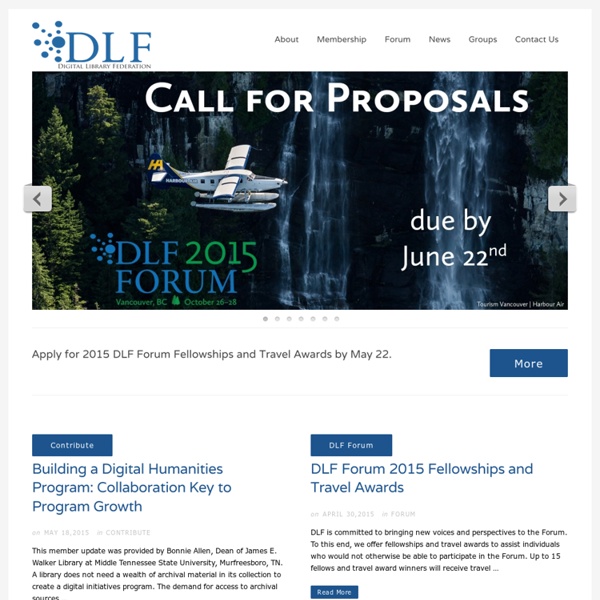



Metadata Librarian Experience Centers & Labs Center for Research and Development of Digital Libraries (CRADLE) CRADLE is a federation of parties interested in the migration, management, and accessibility of digital information. They serve as a test bed for the development of digital libraries, while focusing on the training and education of digital librarians. Principal Investigators: Brad Hemminger, Gary Marchionini, Helen Tibbo, Paul Jones Informatics and Visualization Lab (IVlab) The IVlab houses research in the areas of informatics (bioinformatics and medical informatics), digital libraries, visualization, computer human interaction, and databases. Principal Investigators: Brad Hemminger Interaction Design Lab (IDL) IDL facilitates research and development in electronic information environments such as digital libraries, electronic publications, distributed courses, and shared work spaces. Principal Investigators: Gary Marchionini, Barbara Wildemuth Metadata Research Center (MRC) Principal Investigator: Jane Greenberg
PREMIS: Preservation Metadata Maintenance Activity The PREMIS Data Dictionary for Preservation Metadata is the international standard for metadata to support the preservation of digital objects and ensure their long-term usability. Developed by an international team of experts, PREMIS is implemented in digital preservation projects around the world, and support for PREMIS is incorporated into a number of commercial and open-source digital preservation tools and systems. The PREMIS Editorial Committee coordinates revisions and implementation of the standard, which consists of the Data Dictionary, an XML schema, and supporting documentation. Data Dictionaries & Schemas Maintenance Guidelines and Conformance Implementation and Tools Supporting Documentation The PREMIS maintenance activity is responsible for maintaining, supporting, and coordinating future revisions to the PREMIS data dictionary. and RLG The PREMIS 3.0 data dictionary was issued in June 2015.
Digital Libraries Collaborative Research: Curriculum Development: Digital Libraries[edit] The project was originally funded for 1/1/2006 - 12/31/2008. This was extended until 12/31/2009. Project Team at VT: PI: Edward A. This material is based upon work supported by the National Science Foundation under Grant Nos. Module Development[edit] Table 1. Note: Click here for a list of modules signed up for developments Table 2. Note: These modules can be used along with IR-related DL curriculum modules. Table 3. Note: These modules have been developed for the LucidWorks software, which is an integrated tool for processing Big Data. Table 4. Note: These modules have been developed for software tools, which are related to sound and image manipulations as well as biometric image software. Versions of the Curriculum Framework Developed by VT/UNC Project[edit] Module Template[edit] Template (since Aug. 27, 2007)Template (before Aug. 27, 2007) DL Syllabi Analyses[edit] Others[edit] DL Educational Taxonomy Journal[edit]
QA Focus Case Studies The QA Focus project published a series of case studies which provided examples of quality assurance procedures and illustrate how projects and services implement standards and best practices in order to achieve interoperability, maximise accessibility, etc. Case studies are available in the following areas: Note that if you wish to access all of the case studies in a single file (which is suitable for printing) you should go the the View-All links on this page. Note also that information on writing a case study is also available. RSS Feeds You should also note that RSS feeds of the case studies are available. Case Study Documents Standards Standards And Accessibility Compliance In The FAILTE Project Web Site, (case study 02)[HTML format] (see also Access / Web)Standards For e-learning: The e-MapScholar Experience, (case study 05)[HTML format] (also related to standards)Standards and Accessibility Compliance for the DEMOS Project Web Site, (case study 10)[HTML format] (see also Access / Web)
gestioninformacionUdeM - 8-Inteligencia Organizacional Espacio para recopilar notas de clase, hace parte del entregable de evaluación de la materia. Marzo 2 de 2015 Clase 1. Hacia la Inteligencia Colectiva Carolina Monsalve V. ¿Hacia donde crees que conduce la inteligencia colectiva en las organizaciones? Bibliografía de interés:Understanding Information OverloadThe Information Diet Notas sobre libro muy interesante sobre el tema. Claudia María Tabares BetancurAlgunos de los autores que han aportado a construir la idea de Inteligencia Colectiva son: Pierre Lévy (1994), Peter Russell (1983), Douglas (1979) Hofstadter, Tom Atlee (1993), Howard Bloom (1995), Gottfried Mayer-Kress (2003), entre otros. Clase2 Diego F. Carolina Monsalve V. Gestión del Conocimiento Personal ¿Estamos preparados para gestionar nuestro propio conocimiento? Gestión del Conocimiento Personal Herramientas de Gestión del Conocimiento personal para el uso EmpresarialHerramientas de Gestión del Conocimiento Personal Clase3 Claudia M. Clase4 Clase5. Carolina Monsalve Clase6 Clase7 Clase8
NLM Metadata Schema (Approved February 2002) (Revised July 29, 2004) The NLM metadata schema is based on the metadata terms maintained by the Dublin Core Metadata Initiative, including elements, element refinements, encoding schemes, and vocabulary terms (cf. It also incorporates some of the best practice recommendations of the DC-Library Application Profile (DC-Lib) (cf. In the list which follows, the elements in the NLM Metadata schema are outlined using the following conventions: The key used for "Identifier" is: DC = Approved Dublin Core elements and qualifiersNLMDC = Approved Dublin Core elements with NLM-defined qualifiersNLM = NLM-defined elements The key for the element requirements is: R = RequiredRA = Required if applicableO = Optional Element: Title Name: Title Identifier: DC.Title Definition: A name given to the resource Required: R Repeatable: N Comments: N/A Element: Subject, MeSH
The purpose of CLIR’s Digital Library Federation program is to build and support a robust, engaged community whose members share a vested interest in advancing digital libraries. To this end, DLF serves as a resource and catalyst for collaboration among digital library developers, project managers, and all who are invested in digital library issues. by feillet Oct 12